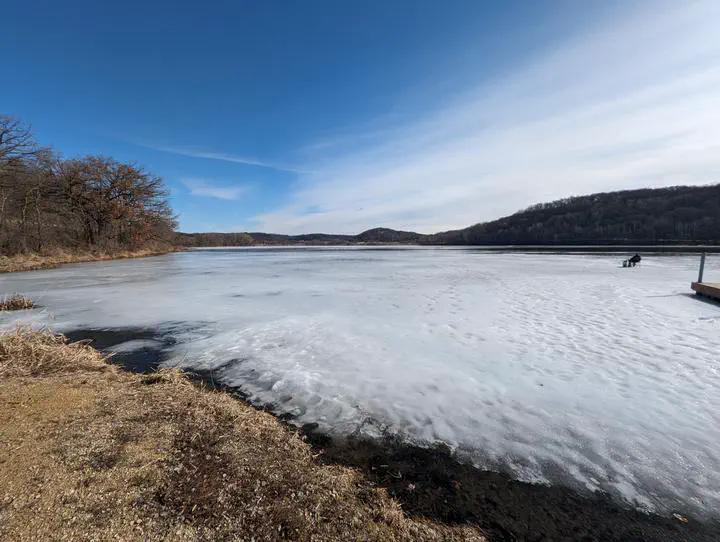Climate change and phenology

Climate change is rapidly transforming freshwater ecosystems. We have used a range of approaches to understand the effects of climate change in inland waters, including analysis of long-term historical data, over-winter experiments, and simulation modeling.
Our research has shown a number of climate impacts on inland aquatic ecosystems. For instance, warming waters are reducing available habitat for important cold- and coolwater species. A particular research focus revolves around the study of phenology, or the timing of biological events. Our work has shown that spring ice-off and fish spawning phenology are becoming increasingly unpredictable, with deleterious effects on spring spawning species like walleye. Thus, increasingly variable ice phenology on lakes appears to alter the form and function of aquatic food webs, potentially causing more frequent and extreme mismatches between predators and prey. Warmer winters may also reduce the reproductive capacity of coolwater fishes through influences on egg quality. Warmwater species and aquatic invasive species may experience increased habitat suitability under these changing conditions, portending significant changes to the fish communities present in many north-temperate lakes. To grapple with these changes, I have begun work to expand on the RAD (Resist-Accept-Direct) framework to develop forward thinking approaches to managing projected changes to the fisheries landscape.
Photo: Ice-off on Indian Lake, WI. Credit: Zach Feiner.
Relevant publications
Xu, L., Z.S. Feiner, P. Frater, G.J.A. Hansen, R. Ladwig, C.P. Paukert, M. Verhoeven, L. Wszola, and O.P. Jensen. 2024. Asymmetric impacts of climate change on thermal habitat suitability for inland lake fishes. Nature Communications. doi: 10.1038/s41467-024-54533-2.
Barta, M., J.R. Reed, T.A. Cichosz, A.D. Shultz, M. Luehring, G.G. Sass, and Z.S. Feiner. 2024. Lagging spawning and increasing phenological extremes jeopardize walleye (Sander vitreus) in north-temperate lakes. Limnology and Oceanography Letters. doi: 10.1002/lol2.10383.
Solokas, M.A., Z.S. Feiner, R. Al-Chokachy, P.E. Budy, J.T. DeWeber, J. Sarvala, G.G. Sass, S.A. Tolentino, T.E. Walsworth, and O.P. Jensen. 2023. Shrinking body size and climate warming: Many freshwater salmonids do not follow the rule. Global Change Biology 29: 2478-2492. doi: 10.1111/gcb.16626.
Coulter, D.P., Z.S. Feiner, A.A. Coulter, and M.W. Diebel. 2022. Using individual-based models to develop invasive species risk assessments by predicting species habitat suitability. Journal of Applied Ecology 59: 3083-3097. doi: 10.1111/1365-2664.14304.
Feiner, Z.S., A.D. Shultz, G.G. Sass, A. Trudeau, M.G. Mitro, C.J. Dassow, A.W. Latzka, D.A. Isermann, B.M. Maitland, J.J. Homola, H.S. Embke, and M. Preul. 2022. Resist-Accept-Direct (RAD) considerations for climate change adaptation in fisheries: the Wisconsin experience. Fisheries Management and Ecology 29: 346-363.
Feiner, Z.S., Dugan, H.A., N.R. Lottig, G.G. Sass, and G.A. Gerrish. 2022. A perspective on the ecological and evolutionary consequences of phenological variability in north-temperate lakes. Canadian Journal of Fisheries and Aquatic Sciences 79: 1590-1604.
Brandt, E.J., Z.S. Feiner, A.W. Latzka, and D.A. Isermann. 2022. Similar environmental conditions are associated with Walleye and Yellow Perch recruitment success in Wisconsin lakes. North American Journal of Fisheries Management 42: 630-641.
Collingsworth, P.D., D.B. Bunnell, M.W. Murray, Y.-C. Kao, Z.S. Feiner, R.M. Claramunt, B.M. Lofgren, T.O. Höök, and S.A. Ludsin. 2017. Climate change as a long-term stressor for the fisheries of the Laurentian Great Lakes of North America. Reviews in Fish Biology and Fisheries 27: 363-391.